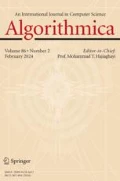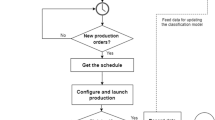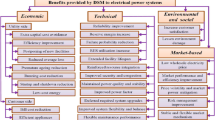Abstract
We study a scheduling problem arising in demand response management in smart grid. Consumers send in power requests with a flexible feasible time interval during which their requests can be served. The grid controller, upon receiving power requests, schedules each request within the specified interval. The electricity cost is measured by a convex function of the load in each timeslot. The objective is to schedule all requests with the minimum total electricity cost. Previous work has studied cases where jobs have unit power requirement and unit duration. We extend the study to arbitrary power requirement and duration, which has been shown to be NP-hard. We give the first online algorithm for the general problem and prove that the problem is fixed parameter tractable. We also show that the online algorithm is the best-possible in an asymptotically sense when the objective is to minimize the peak load. In addition, we observe that the classical non-preemptive machine minimization problem is a special case of the smart grid problem with min-peak objective and show that we can achieve the best-possible competitive ratio in an asymptotically sense when solving the non-preemptive machine minimization problem.

Similar content being viewed by others
References
Alamdari, S., Biedl, T., Chan, T.M., Grant, E., Jampani, K.R., Keshav, S., Lubiw, A., Pathak, V.: Smart-grid electricity allocation via strip packing with slicing. In: WADS, pp. 25–36. Springer (2013)
Albers, S.: Energy-efficient algorithms. Commun. ACM 53(5), 86–96 (2010)
Azar, Y.: On-line load balancing. In: Online Algorithms, pp. 178–195. Springer (1998)
Bansal, N., Kimbrel, T., Pruhs, K.: Speed scaling to manage energy and temperature. J. ACM 54(1), 1–39 (2007)
Bell, P.C., Wong, P.W.H.: Multiprocessor speed scaling for jobs with arbitrary sizes and deadlines. J. Comb. Optim. 29(4), 739–749 (2015)
Burcea, M., Hon, W., Liu, H., Wong, P.W.H., Yau, D.K.Y.: Scheduling for electricity cost in a smart grid. J. Sched. 19(6), 687–699 (2016)
Caron, S., Kesidis, G.: Incentive-based energy consumption scheduling algorithms for the smart grid. In: SmartGridComm, pp. 391–396. IEEE (2010)
Chau, V., Feng, S., Thang, N.K.: Competitive algorithms for demand response management in smart grid. In: M.A. Bender, M. Farach-Colton, M.A. Mosteiro (eds.) LATIN 2018: Theoretical Informatics - 13th Latin American Symposium, Buenos Aires, Argentina, April 16-19, 2018, Proceedings, Lecture Notes in Computer Science, vol. 10807, pp. 303–316. Springer (2018). https://doi.org/10.1007/978-3-319-77404-6_23
Chen, C., Nagananda, K.G., Xiong, G., Kishore, S., Snyder, L.V.: A communication-based appliance scheduling scheme for consumer-premise energy management systems. IEEE Trans. Smart Grid 4(1), 56–65 (2013)
Chen, L., Megow, N., Schewior, K.: An \({O}(\log m)\)-competitive algorithm for online machine minimization. In: SODA, pp. 155–163. ACM (2016)
Chuzhoy, J., Guha, S., Khanna, S., Naor, J.S.: Machine minimization for scheduling jobs with interval constraints. In: FOCS, pp. 81–90. IEEE (2004)
Cieliebak, M., Erlebach, T., Hennecke, F., Weber, B., Widmayer, P.: Scheduling with release times and deadlines on a minimum number of machines. In: IFIP TCS, pp. 209–222. Springer (2004)
Djurović, M.Ž., Milačić, A., Kršulja, M.: A simplified model of quadratic cost function for thermal generators. In: DAAAM, pp. 25–28. DA (2012)
European Commission: Europen smartgrids technology platform. ftp://ftp.cordis.europa.eu/pub/fp7/energy/docs/smartgrids_en.pdf (2006)
Fang, K., Uhan, N.A., Zhao, F., Sutherland, J.W.: Scheduling on a single machine under time-of-use electricity tariffs. Ann. OR 238(1–2), 199–227 (2016)
Fang, X., Misra, S., Xue, G., Yang, D.: Smart grid: the new and improved power grid—a survey. IEEE Commun. Surv. Tutor. 14(4), 944–980 (2012)
Farhangi, H.: The path of the smart grid. IEEE Power Energy Mag. 8(1), 18–28 (2010)
Feng, X., Xu, Y., Zheng, F.: Online scheduling for electricity cost in smart grid. In: COCOA, pp. 783–793. Springer (2015)
Fulkerson, D., Gross, O.: Incidence matrices and interval graphs. Pac. J. Math. 15(3), 835–855 (1965)
Halin, R.: Some remarks on interval graphs. Combinatorica 2(3), 297–304 (1982)
Hamilton, K., Gulhar, N.: Taking demand response to the next level. IEEE Power Energy Mag. 8(3), 60–65 (2010)
Ipakchi, A., Albuyeh, F.: Grid of the future. IEEE Power Energy Mag. 7(2), 52–62 (2009)
Jansen, K., Land, F., Land, K.: Bounding the running time of algorithms for scheduling and packing problems. SIAM J. Discrete Math. 30(1), 343–366 (2016)
Kannberg, L., Chassin, D., DeSteese, J., Hauser, S., Kintner-Meyer, M., (U.S.), P.N.N.L., of Energy, U.S.D.: GridWise: The Benefits of a Transformed Energy System. Pacific Northwest National Laboratory (2003)
Karbasioun, M.M., Shaikhet, G., Kranakis, E., Lambadaris, I.: Power strip packing of malleable demands in smart grid. In: ICC, pp. 4261–4265. IEEE (2013)
Koutsopoulos, I., Tassiulas, L.: Control and optimization meet the smart power grid: Scheduling of power demands for optimal energy management. In: e-Energy, pp. 41–50. ACM (2011)
Krishnan, R.: Meters of tomorrow [in my view]. IEEE Power Energy Mag. 6(2), 94–96 (2008)
Li, H., Qiu, R.C.: Need-based communication for smart grid: When to inquire power price? In: GLOBECOM, pp. 1–5. IEEE (2010)
Li, Z., Liang, Q.: Performance analysis of multiuser selection scheme in dynamic home area networks for smart grid communications. IEEE Trans. Smart Grid 4(1), 13–20 (2013)
Liu, F., Liu, H., Wong, P.W.H.: Optimal nonpreemptive scheduling in a smart grid model. In: ISAAC, pp. 53:1–53:13. LIPIcs (2016)
Llaria, A., Jiménez, J., Curea, O.: Study on communication technologies for the optimal operation of smart grids. Trans. Emerg. Telecommun. Technol. 25(10), 1009–1019 (2014)
Lockheed Martin: SEELoad™ Solution. http://www.lockheedmartin.co.uk/us/products/energy-solutions/seesuite/seeload.html
Logenthiran, T., Srinivasan, D., Shun, T.Z.: Demand side management in smart grid using heuristic optimization. IEEE Trans. Smart Grid 3(3), 1244–1252 (2012)
Lui, T., Stirling, W., Marcy, H.: Get smart. IEEE Power Energy Mag. 8(3), 66–78 (2010)
Ma, C.Y.T., Yau, D.K.Y., Rao, N.S.V.: Scalable solutions of markov games for smart-grid infrastructure protection. IEEE Trans. Smart Grid 4(1), 47–55 (2013)
Maharjan, S., Zhu, Q., Zhang, Y., Gjessing, S., Basar, T.: Dependable demand response management in the smart grid: a stackelberg game approach. IEEE Trans. Smart Grid 4(1), 120–132 (2013)
Masters, G.M.: Renewable and efficient electric power systems. Wiley, Hoboken (2013)
Mohsenian-Rad, A.H., Wong, V., Jatskevich, J., Schober, R.: Optimal and autonomous incentive-based energy consumption scheduling algorithm for smart grid. In: ISGT, pp. 1–6. IEEE (2010)
Mohsenian-Rad, A.H., Wong, V.W., Jatskevich, J., Schober, R., Leon-Garcia, A.: Autonomous demand-side management based on game-theoretic energy consumption scheduling for the future smart grid. IEEE Trans. Smart Grid 1(3), 320–331 (2010)
REGEN Energy Inc: ENVIROGRID™ SMART GRID BUNDLE. http://www.regenenergy.com/press/announcing-the-envirogrid-smart-grid-bundle/
Saha, B.: Renting a cloud. In: FSTTCS, pp. 437–448. Schloss Dagstuhl–Leibniz-Zentrum fuer Informatik (2013)
Salinas, S., Li, M., Li, P.: Multi-objective optimal energy consumption scheduling in smart grids. IEEE Trans. Smart Grid 4(1), 341–348 (2013)
Samadi, P., Mohsenian-Rad, A.H., Schober, R., Wong, V.W., Jatskevich, J.: Optimal real-time pricing algorithm based on utility maximization for smart grid. In: SmartGridComm, pp. 415–420. IEEE (2010)
Tang, S., Huang, Q., Li, X.Y., Wu, D.: Smoothing the energy consumption: Peak demand reduction in smart grid. In: INFOCOM, pp. 1133–1141. IEEE (2013)
Toronto Hydro Corporation: Peaksaver Program. http://www.peaksaver.com/peaksaver_THESL.html
UK Department of Energy & Climate Change: Smart grid: A more energy-efficient electricity supply for the UK. https://www.gov.uk/smart-grid-a-more-energy-efficient-electricity-supply-for-the-uk (2013)
US Department of Energy: The Smart Grid: An Introduction. http://www.oe.energy.gov/SmartGridIntroduction.htm (2009)
Yao, F., Demers, A., Shenker, S.: A scheduling model for reduced CPU energy. In: FOCS, pp. 374–382. IEEE (1995)
Yaw, S., Mumey, B.: An exact algorithm for non-preemptive peak demand job scheduling. In: COCOA, pp. 3–12. Springer (2014)
Yaw, S., Mumey, B., McDonald, E., Lemke, J.: Peak demand scheduling in the smart grid. In: SmartGridComm, pp. 770–775. IEEE (2014)
Zpryme Research & Consulting: Power systems of the future: The case for energy storage, distributed generation, and microgrids. http://smartgrid.ieee.org/images/features/smart_grid_survey.pdf (2012)
Acknowledgements
Prudence W.H. Wong is partially supported by Networks Sciences and Technologies, University of Liverpool. Hsiang-Hsuan Liu is partially supported by a studentship from the University of Liverpool-National Tsing-Hua University Dual PhD programme.
Author information
Authors and Affiliations
Corresponding author
Additional information
Publisher's Note
Springer Nature remains neutral with regard to jurisdictional claims in published maps and institutional affiliations.
A preliminary version of this paper titled “Optimal Nonpreemptive Scheduling in a Smart Grid Model” appeared in Proceedings of the 27th International Symposium on Algorithms and Computation, ISAAC 2016 [30] and some results are improved in this version.
Rights and permissions
About this article
Cite this article
Liu, FH., Liu, HH. & Wong, P.W.H. Non-preemptive Scheduling in a Smart Grid Model and Its Implications on Machine Minimization. Algorithmica 82, 3415–3457 (2020). https://doi.org/10.1007/s00453-020-00733-3
Received:
Accepted:
Published:
Issue Date:
DOI: https://doi.org/10.1007/s00453-020-00733-3




